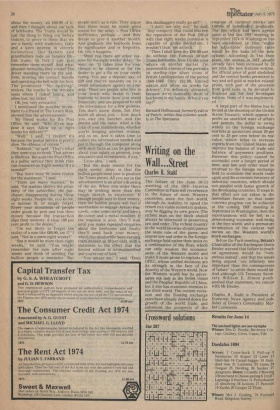Writing on the Wall... Street
Charles lt. Stahl
The failure of the June 10-11 meeting of the IMF Interim Committee in Paris will reverberate in the future of most Western countries, since the free world, through its inability to speed the return to a viable monetary system, may be digging its qwn grave. The richest man on the block should always be interested in preserving law and order. The richest country in the world likewise should pursue the same rule of the game, and impose law and order in the foreign exchange field rather than insist on a continuation of the float, which can only weaken the economic unity of the Western world and make it more prone to exploits a la OPEC, whose unified decisions are its strength in the face of the disunity of the Western world. Now the Western world has its adversaries not only in the Soviet Union and the Peoples' Republic of China, but it also has economic enemies in the third world. The current recession and the floating exchange rates have already slowed down the growth of the world trade, and enhanced the prospects of the creation of currency blocks and cartels of commodity producers. The line which had been agreed upon at the last IMF meeting in September 1974 in Washington has been abandoned, i.e. that "stable but adjustable" currency rates would be the basis of the new system. According to the then plans, the quotas in IMF should already have been increased by 32 per cent, the new statutes written, the official price of gold abolished and the central banks permitted to buy and sell gold at market-related prices, with part of the proceeds from gold sales to be devoted to financial aid for less developed nations. None of it was implemented. A large part of the blame has to be laid at the doorstep of the United States Treasury, which appears to prefer an unsettled state of affairs • and permits the dollar to swing widely in the foreign exchange markets at quotations about 20 per cent to 25 per cent below its real value, which helps to increase exports from the United States and improve the balance of trade and balance of payments positions. However this policy cannot be successful over a longer period of time, and law and order must be returned to the foreign exchange field to stimulate the world trade again and the economic recovery of industrial countries, which should run parallel with faster growth of the developing countries. If steps to that effect are not taken in the immediate future, so that some concrete progress can be achieved at the coming IMF meeting in September in Washington, then the repercussions will be felt in a deteriorating economic well-being in the free world, and a premature termination of the current bull moves on the Western world's stock exchanges. Before the Paris meeting, Britain's Chancellor of the Exchequer Denis Healey warned that failure to reach an agreement would be "very serious indeed", and that the issues being argued "are infinitely less important than the consequences of failure" to settle them would be. And although US Treasury Secretary William E. Simon poohpoohed that statement, we concur with Mr Healey.
Char/es R. Stahl is President of Economic News Agency and publisher of Green's Commodity Market Comments


































 Previous page
Previous page